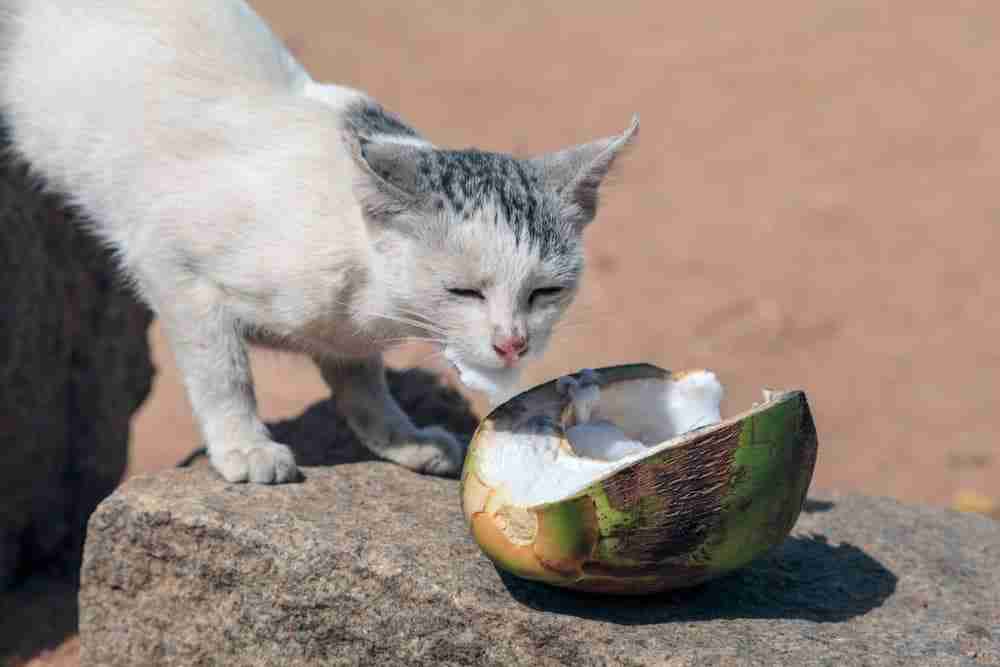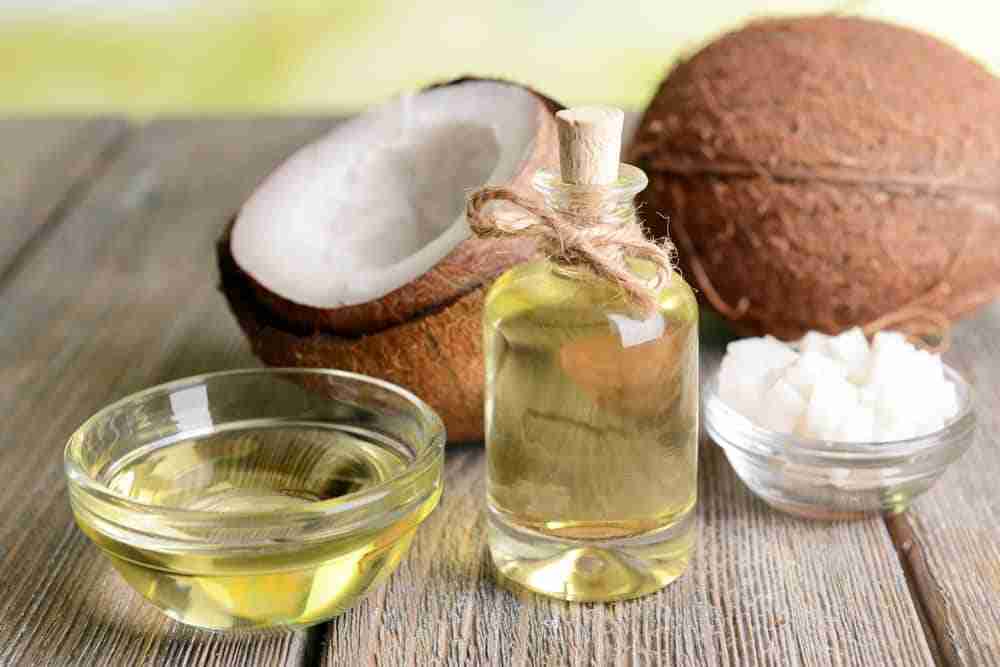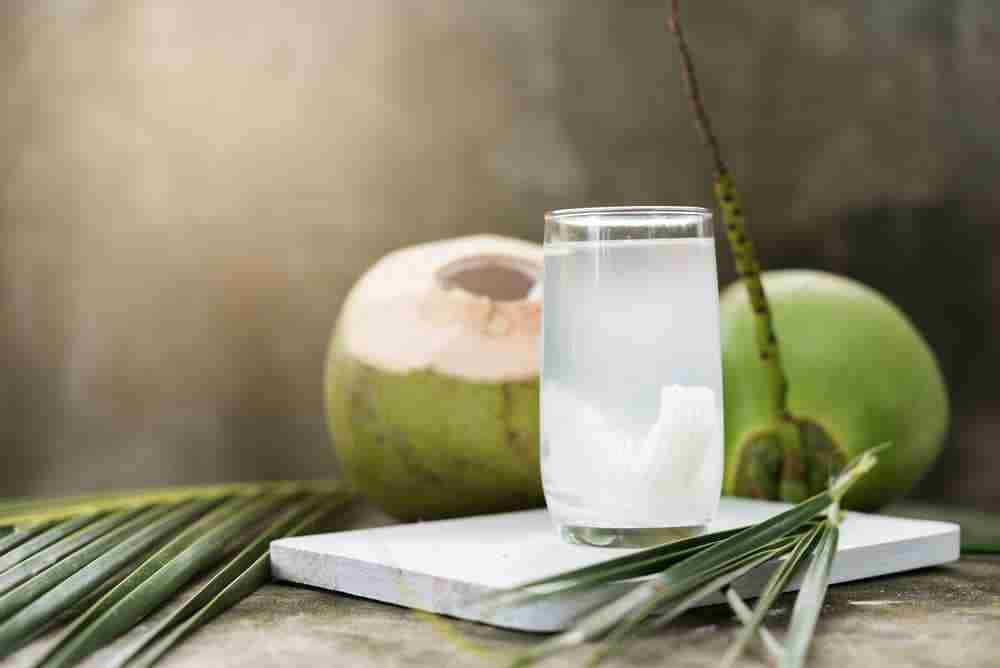Can cats eat coconut? Yes, they sure can! Generally speaking, coconut is nontoxic to cats although you would be hard pushed to suggest it is species-appropriate food for your cat! As with many things moderation is key. Some cats with health issues can develop problems from consuming excess fats and certain ingredients in coconut can get sluggish digestive systems running at the max output! Here we run through how some of the different styles of coconut can be eaten by your cat and what problems they may encounter.
Can Cats Have Coconut Milk?
Coconut milk is the water of the coconut blended with the meat of the coconut and then strained off. It has a milky white appearance that gives rise to the idea that it is milk.
Cats are well known to be lactose intolerant. Many cat owners are also lactose intolerant and may drink coconut milk as a substitute for dairy products. It is natural for those owners to consider giving their cat this milk as a substitute for dairy milk.
However, although coconut milk doesn’t contain lactose, it does contain lauric acid – a short-chain fatty acid. Unfortunately, lauric acid has a tendency to give cats diarrhea. In some cases, owners use it to relieve constipation in their cat.
So if you are ok with the potential side effects of a squitty kitty, then you can consider it ok to give your cat coconut milk. If, the idea of cleaning up after a messy cat grosses you out, restrict the amount you give to your cat. You don’t have to totally avoid giving your cat coconut milk – just don’t give them too much!

Can Cats Have Coconut Water?
Coconut water is the liquid content of fresh coconuts. It is not mixed with the meat of the nut. It has a clear, watery appearance and a mildly sweet, flavor.
Apart from the enjoyable taste, people drink the water for the perceived health benefits that are believed to derive from the high potassium content of coconut water. Potassium reduces or stabilizes blood pressure, creates a healthy water balance in the body, and helps prevent kidney stones. But is potassium any good for cats?
Like in humans, cats can receive benefits from dietary potassium but excessive potassium intake can be dangerous. Too much potassium in the blood can lead to a condition called hyperkalemia. This can give rise to arrhythmias, weakness, and collapse. The odd tipple of coconut water is not going to give rise to this condition but allowing your cat to drink coconut water regularly whilst they have kidney disease could be an issue and is something you would want to avoid.
Can Cats Eat Coconut Meat?
The meat of the nut is the shredded white material that we enjoy in deserts. A cat is not going to be able to access this food unless you provide it. A lot of cats seem to enjoy the flaky, crunchy texture, and the creamy sensation that you get from coconut meat. Cats can’t detect sweet flavors as they do not have the appropriate flavor receptors on their tongues so we have to assume it is a texture thing for cats!
A little coconut meat is not going to be bad for your cat. It is not toxic to your cat. Obviously, it is not species-appropriate food so you should limit your cat’s intake to be sure to minimize any potential issues.

Is Coconut Oil Good For Cats?
Coconut oil has numerous benefits for cats. The characteristics of the oil make it beneficial for internal and external use and the antibacterial, antifungal and insecticidal properties of the oil can really do your cat some good. We suggest you check out this article on coconut oil for cats to get an in-depth insight into this useful oil and how your cat can benefit! (Ever wondered does coconut oil kill fleas? Check out our home remedies for fleas on cats article!)
Are There Any Problems With Cats Eating Coconut?
Generally speaking, a healthy cat having a little coconut from time to time will not suffer any issues caused by excessive intake.
It is worth noting that coconut contains lauric acid which is known to cause diarrhea and may help ease constipation. If your cat eats coconut oil or drinks the milk or water and then develops a dicky tummy this is the likely culprit – don’t think you have poisoned your cat – it is just the lauric acid taking effect.
Cats with pancreatic issues like pancreatitis should avoid high-fat content foods as this can aggravate their condition. Coconut in all its forms is a high-fat food. If your cat has pancreatic issues avoid this food!
Additionally, it is unlikely but possible that excessive, uncontrolled intake of high-fat foods could lead to hepadosis (fatty liver disease) in cats. Your cat would probably have to become obese from the intake so the chances are remote but possible – your cat would probably have to gorge on coconut daily for a long period for this to happen.
So can cats eat coconut? Yes, but to avoid all the potential pitfalls keep it real and if in doubt make it an irregular treat in small quantities rather than a part of your cat’s daily diet!
